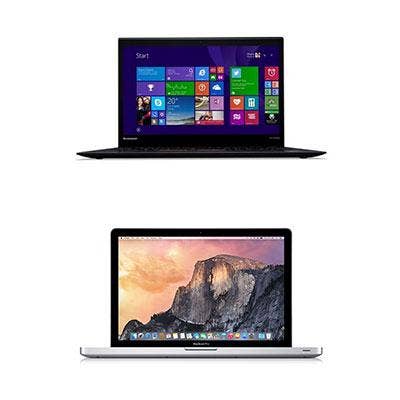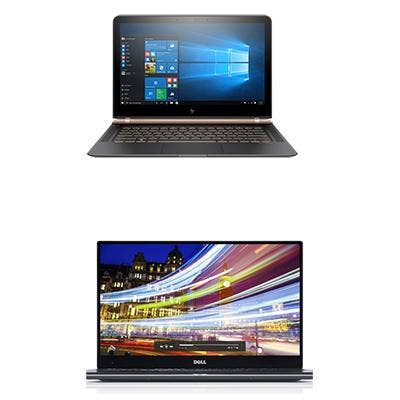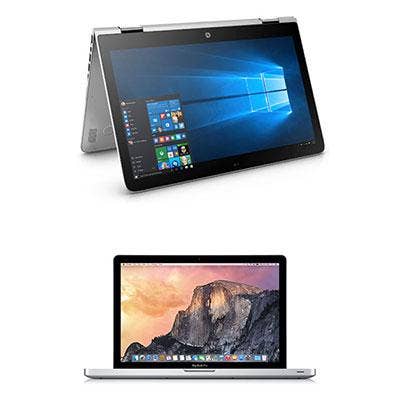Apple Widens Its Lead Over Lenovo In The U.S., And Four Other Takeaways From Gartner's Q4 PC Report

Rough Ride For PC Market
2017 closed out with a difficult quarter for PC makers. Results from the PC market worldwide -- and especially in the U.S. -- were bleak for the most part, according to the fourth-quarter 2017 PC report from research firm Gartner. There were bright spots for manufacturers HP Inc. and Apple, Gartner said, but the news was worse for other major PC competitors, including Dell and Lenovo.
What follows are our five top takeaways from Gartner's Q4 2017 PC market report.

U.S. Market Sees Sharp Decline
While the fourth quarter wasn't as bad as the third quarter for PC makers in the U.S., the fourth quarter still presented a gloomy picture. PC shipments in the U.S. dropped 8 percent in the fourth quarter of 2017, compared with the same period a year earlier. During the third quarter of 2017, U.S. PC shipments had fallen by 10.3 percent year over year. Gartner pointed to competition during the holiday shopping season from devices such as smart speakers and smartphones in explaining the decline. "PCs simply could not compete against these gift items during the holiday season," Mikako Kitagawa, principal analyst at Gartner, said in a news release. Gartner reports that there were two notable growth areas in the U.S. PC market during the fourth quarter, however: high-end PCs and gaming PCs.

Apple Vs. Lenovo
After Apple surpassed Lenovo in U.S. market position in the third quarter to become the No. 3 player, Apple remained there in the fourth quarter. In fact, Apple widened its lead as Lenovo lost ground. According to Gartner, Apple achieved a U.S. PC market share of 13 percent in the fourth quarter, while Lenovo's share of the market was 11.8 percent. By comparison, the gap between the two companies was much closer in the third quarter, with Apple capturing 12.8 percent of the market and Lenovo getting 12.2 percent.
Both companies saw U.S. PC shipments decline during the fourth quarter, though Apple was only down by 1.6 percent from the same period a year earlier. By contrast, Lenovo's U.S. PC shipments plunged 23.6 percent during the fourth quarter on a year-over-year basis.

HP Vs. Dell
During the fourth quarter of 2017, HP Inc. was the only major PC manufacturer to actually increase its shipments in the U.S. The company's shipments rose 1.6 percent in the fourth quarter compared with the same quarter of 2016. That allowed HP to cement its No. 1 market position, with a 33.7 percent share of the U.S. PC market in the fourth quarter. No. 2 player Dell fell further behind HP in the fourth quarter as its U.S. PC shipments slid 12.3 percent, for a market share of 24.3 percent.

Fourth-Quarter Global Results
HP Inc. also maintained its No. 1 position in the global PC market during the fourth quarter, with a 22.5 percent share, according to Gartner. That's up from 20.7 percent a year earlier, and the results were buoyed by 6.6 percent growth in global PC shipments -- far exceeding the shipment growth of the other major PC vendors. Lenovo came in at No. 2, with 22 percent market share, though shipments fell 0.7 percent during the quarter. Dell and Apple both saw small gains in global PC shipments and market share during the fourth quarter, with Dell capturing 15.2 percent of the market and Apple at 7.6 percent.
During the fourth quarter, Gartner reported that PC shipments fell 2 percent globally.

Vendor Results For 2017 Globally
For 2017 as a whole, HP (with 4.6-percent growth in shipments) and Apple (with 4.1 percent growth) were the two big winners in the worldwide PC market, according to Gartner. Lenovo's shipments declined 2.2 percent, while Dell's shipments were up 1.1 percent, Gartner found. In terms of market share, HP edged out Lenovo with 21 percent market share versus 20.8 percent. Dell's global PC market share in 2017 came in at 15.2 percent, while Apple finished in the No. 4 spot with 7.4 percent of the market. Asus (6.8 percent) and Acer (6.5 percent) followed in fifth and sixth place, respectively.